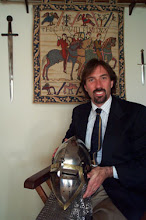A Little Touch Of Arthur On Sunday Night

They say that every generation re-invents the legend of King Arthur to meet its own needs, and to reflect its own values. The Victorians had the nostalgic idealism of Tennyson’s Idylls of the King; in the 60’s there was Camelot as a spot for peaceful happ’ly ever-aftering; and ushering in the 70’s was the biting social satire of Monty Python and the Holy Grail.
And now, fans of the Arthurian lore have another interpretation of the legends to consider: the series Merlin, which is airing on NBC Sunday nights. This show turns its focus backwards, exploring the “origin story” of Arthur (the young prince), Merlin (the budding wizard) and many of the other familiar characters in their formative years.
There are plenty of overviews and reviews of NBC’s Merlin on the web (including in The New York Times, The Hollywood Reporter and the Boston Globe), so there’s no need to rehash the basic details of the premise here. More to the point might be some insight into how the concept of chivalry is treated in this series, and what the message of Merlin is for today’s world.
On one hand, Merlin falls into the realm of Arthurian stories founded on the premise that knights, quests, jousting and castles have to be “kid’s stuff.” As many reviewers have pointed out, the writing, acting and production of Merlin seems better suited for a Saturday morning adventure than for a prime-time network historical drama. Don’t look for any nuanced characterizations of heroes in the making, or subtle explorations of the challenges of following a code of honor (much less developing and establishing such a code – which could have been an intriguing subject in an “origin” story).
By making the world of Camelot a place of simplistic storylines and campy dialogue, perhaps Merlin is a not-too-flattering reflection of ethics in today’s society: Where children are taught to “play nice,” “be fair” and “do the right thing,” then turned loose in a world where those kinds of ideals are largely considered impediments to success. We might think of Merlin, on some level, as a cautionary reminder that in today’s world, decency, honor and chivalry are too often treated as “childish fantasies.”
On the other hand, perhaps the contemporary lesson of Merlin’s King Arthur can be found more in what isn’t there than in what is. For instance, don’t look for any foreshadowing of the sword in the stone in this tale — Arthur is already the acknowledged (and entitled) prince and heir of the realm. There won’t be any need for him to draw a magical sword to prove he’s next in line to be king.
Similarly, don’t expect Arthur’s prospective bride to be portrayed as a princess. Although Guenevere is traditionally characterized as the daughter of King Leodagrance, whose marriage to Arthur brings peace to the fractured realm (and, incidentally, a large, circular table to the halls of Camelot), in this version Gwen is a scullery maid to Morganna and daughter of a humble town blacksmith.
And along with the traditional story elements, another thing that seems to be missing in Merlin is a recognition of moral absolutes. In the course of the first few episodes, Merlin is told repeatedly: “There is no right and wrong, only what is.” (Another way of saying, “The ends justify the means.”) Is this most recent adaptation of the King Arthur legend a story that has been stripped of its foundational elements, thus reflecting a world at risk of being robbed of its core principles as well?
Ironically, there is one element of the traditional Arthurian storyline that does remain in Merlin: Beneath the palace of King Uther Pendragon, there is a cavern where “the great dragon” is imprisoned. (In the usual telling of the story, a pair of dragons resides beneath Uther’s tower, and their struggles cause an earthquake that topples the fortress — Merlin himself reveals the presence of these dragons to King Uther.)
In Merlin, when Merlin need advice and guidance, it is not to his mentor, Gaius the physician, he turns, but rather to this captive monster in its subterranean dungeon, last of the wise and powerful race of dragons that Uther exterminated by royal decree. Is this a subtle depiction of a society in which untrustworthy leaders have abandoned their sense of chivalry and honor in favor of tyranny and brute force? Where a young generation must grope in the darkness for tidbits of wisdom as their role models operate with little regard for the constraints of “right and wrong”? Where chivalry lies chained underground while amoral and self-centered rulers are given free rein in the sunlit world above?
Of course, this maybe focusing far too much philosophical analysis on a lighthearted action show. But if the legends of Camelot reflect cultural identity, then it seems the metaphor deserves consideration at least.
Only time will tell if Merlin has the depth to become a generational portrayal of the lore and ideals of Arthurian legend, or serves merely as a fun and campy (but ultimately forgettable) romp into the world of Camelot. But at least for now, anyone who enjoys the legends of chivalry, whether deeply thought or lighthearted, can enjoy a little touch of Arthur on Sunday nights.
Below: Anthony Head, who plays King Uther Pendragon in Merlin, talks about his role and the approach of the series.
Labels: camelot, King Arthur, magic, merlin, nbc, television, Uther


0 Comments:
Post a Comment
Subscribe to Post Comments [Atom]
<< Home